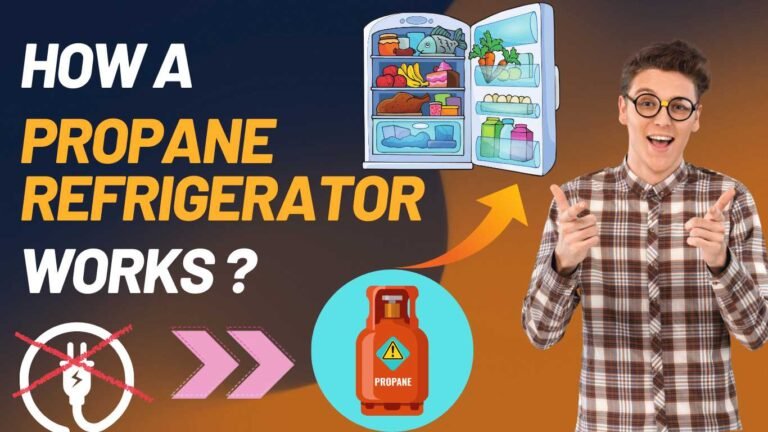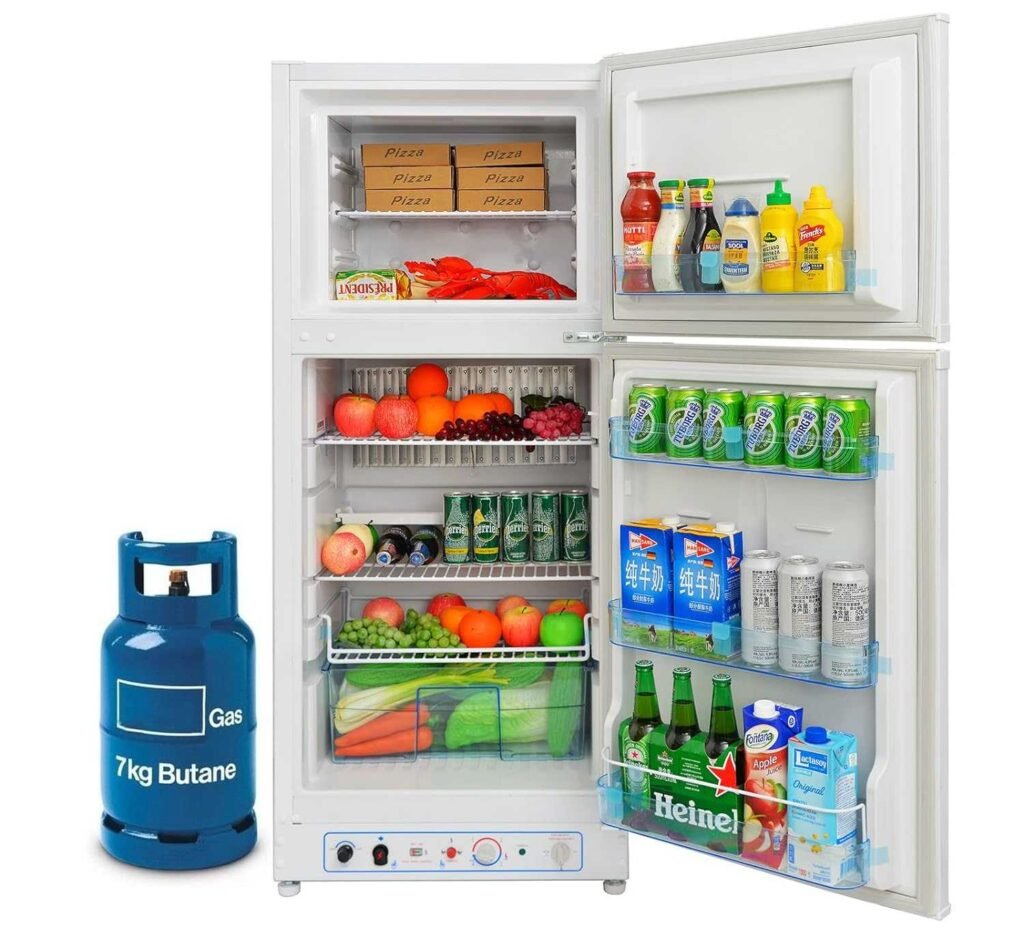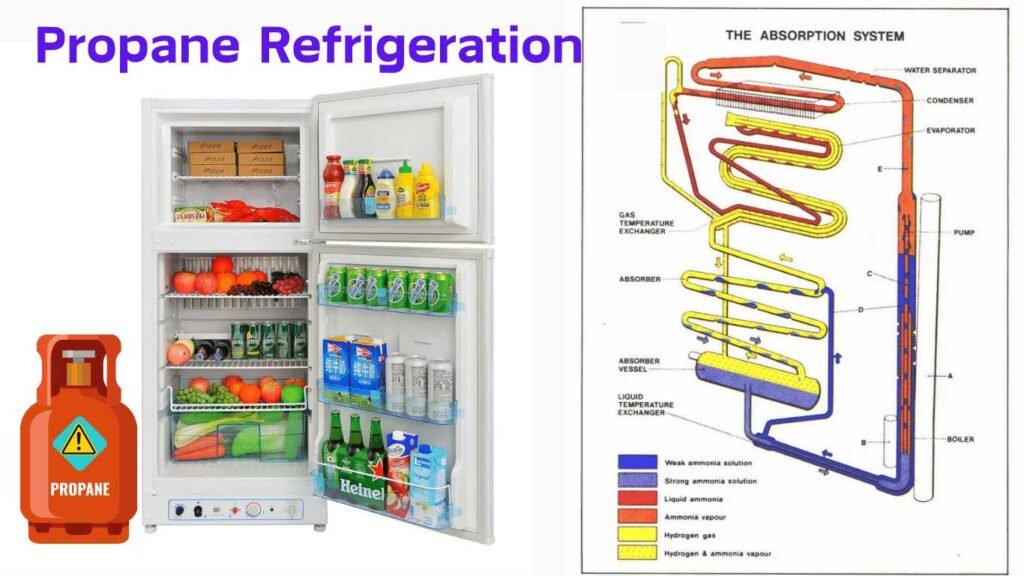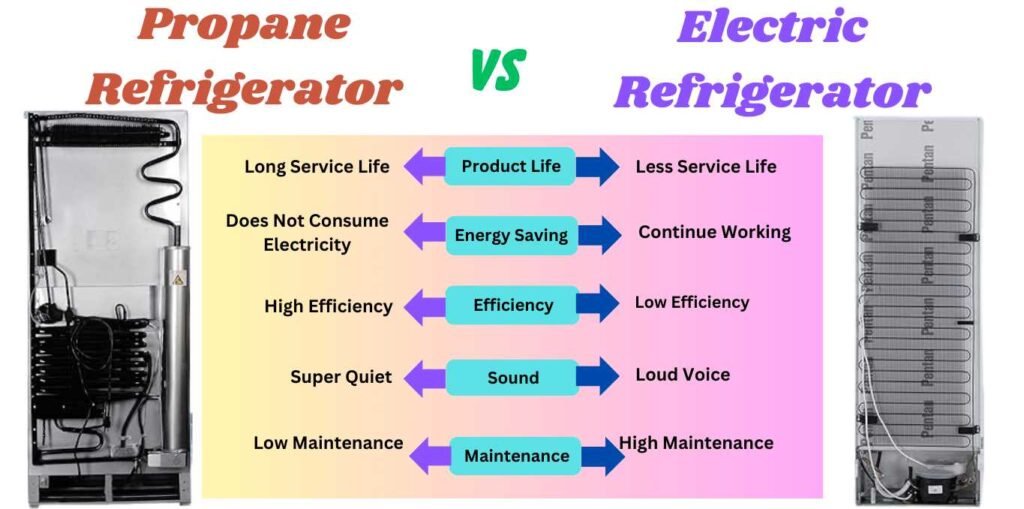Introduction
A propane refrigerator looks a lot like a normal fridge, but it cools food in a very different way. It doesn’t use electricity; instead, it uses propane gas to cool things down. That’s pretty cool, right?
Imagine you are far from electricity, enjoying a cold drink. That’s the great thing about propane refrigeration: it makes off-grid cooling possible. Let’s learn about the science behind how a propane refrigerator works and keeps your drinks and food cool.
People really like these refrigerators for:
- Cabins that aren’t connected to the grid
- Hunting cabins
- Small houses
- Campers and RVs
- Backup for power outages
They don’t need electricity to work, so you can use them to cool off anywhere.
Overview of Propane Refrigerator: Absorption Cooling
Absorption cooling is a method that turns heat into refrigeration without any moving parts. Propane refrigerators use this method. This is very different from the compressor systems that are used in most electric refrigerators.
What are the basic components of Propane Refrigerator ?
The basic components are like:
- Propane Burner: Powers the cooling process, replacing the electric compressor in standard units.
- Cooling Unit: The heart of the refrigerator, where the actual cooling happens.
- Condenser & Evaporator Tubes : Purpose to move ammonia through system
- Thermostat: Controls the temperature inside the refrigerator.
Important Parts of the Propane Refrigerator
- Water
- Ammonia in liquid form
- Hydrogen gas
Historical Background and Present of Manufacturing Quality
Absorption refrigeration technology has been around since 1824, but it didn’t really catch on until the mid-20th century with brands like Servel. EZ Freeze and other high-quality American manufacturers still make durable propane refrigerators that are meant to last in off-grid settings.
Modern units have:
- A lot of insulation
- Burners with high accuracy
- Building with high seals
- Strict factory testing at high temperatures
These new ideas make sure that things work well and are reliable when cooling is important.
How a Propane Refrigerator Works ?
This is where most people ask:
How does a propane refrigerator work?
or
How does a refrigerator run on propane?
The answer is: A propane refrigerator uses a unique process known as absorption refrigeration.
Step-by-Step Process
- A propane generator generates the energy required to heat a chamber inside the fridge holding ammonia and water.
- When the liquid boils, the ammonia gas rises to a condenser where it is cooled back into a liquid.
- The liquid ammonia is then fed into an evaporator containing hydrogen gas.
- A chemical process that involves hydrogen gas and ammonia absorbs heat. The refrigerator’s inside is cooled by heat that is drawn from the refrigerator box. Thus, heat is removed from the refrigerator instead of cold air being blown in.
- Ammonia is converted back into a gas throughout the reaction, and the mixture of ammonia and hydrogen gas travels to a chamber where it is mixed with water.
The hydrogen gas rises back into the evaporator to be utilized once more, while the ammonia gas dissolves into the water solution and the ammonia and water solution initiates a new cycle.
So instead of blowing cold air in, the fridge removes heat from inside. This explains how propane cools a refrigerator without electricity.
Is Propane Used as a Refrigerant?
The answer is a big “Yes”.
Propane can be used as a refrigerant, and in refrigeration systems it is known as R-290.
- Is propane a good refrigerant?
Yes. It is efficient and environmentally friendly. - Is propane a refrigerant in this fridge?
No. In propane refrigerators, propane is the heat source, not the refrigerant. - The refrigerant in this system is ammonia, not propane.
Benefits of Propane Refrigerators for Off-Grid Living
1. Total Energy Independence
Propane refrigerators operate without electricity, making them ideal for locations without grid access. They continue working during outages, fuel shortages, or remote travel.
2. Cost-Efficient Operation
Propane is often less expensive than running generators or maintaining solar battery banks. These refrigerators consume very little fuel, contributing to long-term savings.
3. Reliable Performance in Remote Environments
Propane refrigerators are built for durability and consistent operation, even in harsh climates where electric compressors may struggle.
4. Effective Food Preservation
Stable internal temperatures ensure food freshness, reduce spoilage, and extend storage time between supply trips.
5. Environmentally Considerate
Propane is a clean-burning fuel that produces fewer emissions than many electricity sources, supporting sustainable living goals.
Common Applications of Propane Refrigerators
| Application | Advantage |
|---|---|
| Off-grid homes and remote cabins | Allows full-time refrigeration without electrical infrastructure |
| RVs and campers | Ensures reliable cooling during travel without draining batteries |
| Boats and marine environments | Operates independently from onboard electrical systems |
| Emergency preparedness | Maintains food safety during prolonged blackouts |
Propane Consumption and Efficiency
One of the most appealing qualities of propane refrigerators is their low fuel usage.
- Many RV-sized propane refrigerators use approximately 0.009 gallons of propane per hour.
- A standard 20 lb (4.7 gallon) propane tank can typically power a fridge for 1 to 3 weeks, depending on conditions.
Factors Influencing Fuel Consumption
- Ambient temperature (higher temperatures increase usage)
- Fridge placement and ventilation
- Age and maintenance condition
- Frequency of door openings
How Much Propane Does a Propane Refrigerator Use?
Here are approximate values:
| Type of Refrigerator | Propane Use Per Day | Running Time on 20 lb Tank |
|---|---|---|
| Standard Home/Off-Grid Propane Fridge | 0.5–1 lb/day | 3–5 weeks |
| RV / Camper Propane Refrigerator | 0.5 lb/day | 4–6 weeks |
So, how long will an RV refrigerator run on propane?
Usually 3 to 6 weeks depending on tank size.
Propane Refrigerators vs Electric Refrigerator
The comparison between propane refrigerators and electric refrigerator are Like :
1. Energy Efficiency
Propane refrigerators are surprisingly efficient, given that they don’t rely on continuous electrical power. Their efficiency shines in off-grid settings, where conserving energy is key.
2. Environmental Impact
Using propane, a hydrocarbon, reduces dependence on electricity that might come from non-renewable sources. However, it’s worth noting that propane, while cleaner than many alternatives, does have its own carbon footprint.
3. Cost and Maintenance
Initial costs for propane fridges are higher, but their long-term operation costs can be lower, especially if you have limited access to electricity. Maintenance-wise, they require regular checks but tend to have a long lifespan with proper care.
Propane Refrigerator Safety and Troubleshooting
If you’re using propane refrigerator, this article give you all detail about safety precaution to follow and procedure to troubleshooting to issues.
Safety Tips for Propane Refrigerator
To ensure long-lasting performance:
- Keep the refrigerator level, especially in RVs.
- Ensure proper ventilation behind the fridge.
- Clean burner and flue annually to maintain a strong blue flame.
- Defrost when ice builds up to 1/4 inch.
- Check propane lines regularly using soapy water to detect leaks.
Travel Tip: Many RV owners turn off propane while driving for safety, especially when fueling. A well-cooled fridge can stay food-safe for 4–8 hours if doors remain closed.
Maintenance of Propane Refrigerator
1. Defrosting
Defrost the freezer when frost buildup reaches 1/4 inch to maintain cooling efficiency.
2. Propane Leak Checks
Inspect hoses and connections periodically using a soapy water test. Using propane requires caution. Ensure proper ventilation to avoid gas buildup and always follow the manufacturer’s guidelines for operation and installation.
Troubleshooting of Propane Refrigerator
Propane refrigerators are pretty reliable but watch out for issues like improper cooling or difficulty igniting the propane. Regular cleaning and ensuring the unit is level can solve many common problems.
1. Will Not Light
Air in the gas line may cause illumination issues during first start-up. It may take several minutes to drain the air from the gas lines while lighting these units, so proceed with patience. The gas orifice hole is very small.
2. The refrigerator is excessively warm.
The temperature inside the refrigerator might rise for a variety of reasons, like
- The air’s overall temperature rises.
- The humidity rises.
- Door openings due to usage rise filling to overflowing with food
3. Refrigerator not cooling
- Propane supply is depleted.
- Wind gust blew the flame out.
- Faulty thermocouple.
- Dirty burner.
4. Exhaust Fumes Smell
- Odor from the flue pipe is usually caused by a dirty flame.
- See the Yellow Flame section and Clean the Burner section.
Future of Propane Refrigeration
Propane refrigerators are becoming:
- More efficient
- More eco-friendly
- More popular for sustainable living
- Expect wider use in tiny homes, camper vans, RVs, and remote homes.
Conclusion
Propane refrigerators are a great choice for people who live off the grid or want to use less electricity because they are efficient, reliable, and well-designed. They are great for cabins, RVs, tiny homes, and living in remote areas because they are quiet, last a long time, and don’t use much fuel.
Propane refrigeration keeps showing how useful and practical it can be as more people choose to live in a way that is more sustainable and independent. What started out as a simple cooling system that used heat has turned into a reliable way to live off the grid in the modern world. It’s not just about keeping food cool. It’s about having peace of mind, being able to change your plans, and being able to live where you want.
Final Thoughts
It’s not just picking another appliance when you choose a propane refrigerator. It’s picking:
- Costs of running are lower
- Cooling that works even when the power goes out
- Using energy in a cleaner and more sustainable way
- A solution that lasts a long time and doesn’t need much care
- Propane refrigerators work well for homesteads, remote cabins, RV travelers, and anyone who wants to live off the grid, even if they are miles away from the nearest power line.
Live a simple life. Live on your own. And keep everything cool and comfortable.
Also read – How Does a Microwave Work to Heat Food?
Frequently Asked Questions (FAQs)
This FAQ section is designed to provide quick and clear answers to the most common inquiries we receive. We encourage you to click on a question to find the information you need. If you can’t find an answer here, please don’t hesitate to visit our Contact Us page for further assistance.
Does a propane refrigerator need electricity?
No. Most models work fully without electricity.
Is propane a refrigerant?
Propane can be a refrigerant (called R-290), but in propane refrigerators ammonia is used. Propane is only the heat source.
Why is my propane refrigerator not getting cold?
It may not be level, or the burner may need cleaning.
Are propane refrigerators safe?
Yes, propane refrigerators are generally safe when they are installed correctly, used properly, and maintained regularly. They’ve been used for decades in RVs, cabins, off-grid homes, and even by communities like the Amish who rely on them daily.
However, like any gas appliance, there are important safety points to understand.
How long will an RV refrigerator run on propane?
Usually 3 to 6 weeks depending on tank size.
Is propane a good refrigerant?
Yes, when properly vented and maintained.
Is propane a refrigerant in this fridge?
No. In propane refrigerators, propane is the heat source, not the refrigerant.
How does a refrigerator run on propane?
A propane refrigerator uses a unique process known as absorption refrigeration.
What are the basic components of Propane Refrigerator ?
The basic components are like:
- Propane Burner: Powers the cooling process, replacing the electric compressor in standard units.
- Cooling Unit: The heart of the refrigerator, where the actual cooling happens.
- Condenser & Evaporator Tubes : Purpose to move ammonia through system
- Thermostat: Controls the temperature inside the refrigerator.
Can propane refrigerators be used indoors safely?
Yes, with adequate ventilation and adherence to safety guidelines, propane refrigerators can be used indoors safely.
What maintenance is required for a propane refrigerator?
Regular cleaning, ensuring the unit is level, checking gas connections, and periodic professional inspections are key to maintaining a propane refrigerator.
How long can a propane refrigerator run on a single tank of propane?
It varies based on the refrigerator size and usage, but typically, a 20-pound tank can last about a month.
Having any queries? – Do reach us at info@scivoyage.com














1 thought on “How a Propane Refrigerator Works”
Hello are using WordPress for your blog platform? I’m new to the blog world but I’m trying to get started and create my own. Do you need any html coding knowledge to make your own blog? Any help would be really appreciated!